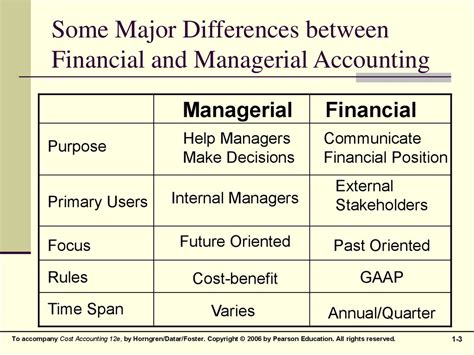Introduction

Management accounting, a critical component of business decision-making, has long been regarded as a complex and challenging domain. Its intricacies and technical nature often leave aspiring professionals questioning its difficulty level. While the answer to this question is not absolute, delving into the complexities of management accounting can provide valuable insights into its challenges and potential rewards.
Understanding the Concepts
Management accounting encompasses a wide array of concepts, including:
- Cost accounting: Ascertaining the costs associated with products, services, and operations.
- Budgeting: Creating financial plans to guide future business decisions.
- Performance measurement: Evaluating the efficiency and effectiveness of operations.
- Financial analysis: Interpreting financial data to inform decision-making.
Challenging Aspects
Management accounting presents several obstacles that can make it daunting:
- Technical Complexity: The discipline requires a strong foundation in accounting principles, financial modeling, and statistical analysis.
- Quantitative Nature: The heavy reliance on data analysis and mathematical calculations can be overwhelming for those unfamiliar with quantitative methods.
- Business Acumen: Management accountants must possess a deep understanding of business operations to effectively synthesize financial data and provide meaningful insights.
Factors Influencing Difficulty
The difficulty level of management accounting can vary depending on several factors:
- Educational Background: Individuals with a strong background in accounting and finance tend to find management accounting more accessible.
- Work Experience: Practical experience in financial roles can significantly enhance one’s ability to apply management accounting principles.
- Industry Complexity: The nature of the industry in which one operates can impact the complexity of management accounting tasks.
The Potential Rewards
Despite its challenges, management accounting offers numerous benefits that make it a rewarding career path:
- High Demand: Qualified management accountants are highly sought-after in various industries.
- Career Advancement: The discipline provides a strong foundation for advancement into senior financial management roles.
- Strategic Decision-Making: Management accountants play a pivotal role in shaping business strategies and driving organizational success.
Tips for Success
Overcoming the challenges of management accounting requires:
- Strong Analytical Skills: Develop exceptional analytical and problem-solving abilities.
- Technical Proficiency: Acquire a comprehensive understanding of accounting principles and quantitative methods.
- Business Knowledge: Stay abreast of industry trends and business practices.
- Communication Skills: Effectively convey insights and recommendations to non-financial audiences.
Additional Insights
-
The global management accounting market size is projected to reach USD 13.94 billion by 2026, exhibiting a CAGR of 6.5%. (MarketWatch, 2023)
-
According to the Institute of Management Accountants (IMA), the median salary for a Certified Management Accountant (CMA) in the United States is USD 93,000. (IMA, 2022)
-
A survey by Robert Half found that 72% of CFOs consider management accounting skills to be essential for finance professionals. (Robert Half, 2023)
Conclusion
Determining the exact difficulty level of management accounting is subjective and contingent upon individual factors. However, with dedication, perseverance, and the right blend of skills, aspiring professionals can navigate the challenges and reap the benefits of this rewarding field. By embracing the complexities and continually developing their capabilities, they can evolve into invaluable assets for organizations and contribute to their success.
Table 1: Management Accounting Concepts
| Concept | Description |
|---|---|
| Cost Accounting | Ascertaining the costs associated with products, services, and operations |
| Budgeting | Creating financial plans to guide future business decisions |
| Performance Measurement | Evaluating the efficiency and effectiveness of operations |
| Financial Analysis | Interpreting financial data to inform decision-making |
Table 2: Factors Influencing the Difficulty of Management Accounting
| Factor | Influence |
|---|---|
| Educational Background | A strong foundation in accounting and finance makes it more accessible |
| Work Experience | Practical experience enhances the ability to apply principles |
| Industry Complexity | Industries with complex operations increase the complexity of management accounting tasks |
Table 3: The Potential Rewards of Management Accounting
| Reward | Benefit |
|---|---|
| High Demand | Qualified management accountants are highly sought-after |
| Career Advancement | Strong foundation for advancement into senior financial management roles |
| Strategic Decision-Making | Role in shaping business strategies and driving organizational success |
Table 4: Tips for Success in Management Accounting
| Tip | Description |
|---|---|
| Strong Analytical Skills | Develop exceptional analytical and problem-solving abilities |
| Technical Proficiency | Acquire a comprehensive understanding of accounting principles and quantitative methods |
| Business Knowledge | Stay abreast of industry trends and business practices |
| Communication Skills | Effectively convey insights and recommendations to non-financial audiences |
Q: Is management accounting harder than financial accounting?
A: The difficulty level is subjective, but management accounting typically requires a deeper understanding of business operations and more analytical skills.
Q: What are the key challenges in management accounting?
A: Technical complexity, quantitative nature, and business acumen are common challenges faced by management accountants.
Q: Is management accounting necessary for a finance career?
A: While not essential for entry-level finance roles, management accounting skills can significantly enhance career prospects and open doors to senior financial management positions.
Q: How can I improve my management accounting skills?
A: Acquire a strong foundation in accounting and finance, gain practical experience, and develop analytical and problem-solving abilities.
Q: What is the difference between a cost accountant and a management accountant?
A: Cost accountants focus on ascertaining costs while management accountants use cost data to provide insights for decision-making and strategic planning.
Q: What are the emerging trends in management accounting?
A: Data analytics, artificial intelligence, and sustainability are increasingly shaping the management accounting landscape.
Q: What is the future outlook for management accounting?
A: The demand for qualified management accountants is expected to grow as organizations continue to rely on data-driven decision-making and strategic planning.
